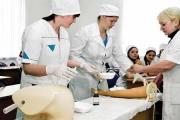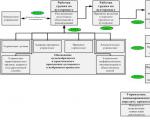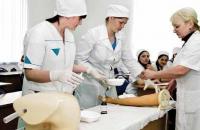Every year hundreds of nurses study to become cosmetologists. After training with people with secondary medical education. education, there are three ways: get a job in a cosmetology clinic and work in conjunction with a doctor, open your own private practice, or get a job in a salon with a medical license and start working independently, without the participation of a cosmetologist. The third option – independent work of nurses in salons with a medical license – causes the most controversy. Let's take a closer look at it.
Nurse and esthetician rolled into one
If you strictly follow the letter of the law, then everything procedures In cosmetology, a nurse can perform only as prescribed by a doctor. And if so, then that’s it – no independent work.
On the other hand, if the nurse wants to provide household cosmetic services(and this is 70% of all cosmetology, for example, complex cleanings or hardware treatments), then no doctor is legally needed here. But to perform a full range of household services, only documents in nursing cosmetology are not enough - you need a diploma in cosmetology.
At the House of Russian Cosmetics, you can obtain cosmetology and cosmetology nurse certificates within the same course; in many other educational institutions you will have to study twice.
Therefore, the nurse has two legal options:
- Work in conjunction with a doctor, carrying out his instructions (we will talk in detail about the nuances of this good career option in the next article).
- In addition to “”, take courses and get the opportunity to perform all household services (this is 70% of the entire range of modern cosmetology). A person with a medical education in Russia is more trustworthy, so in the eyes of the client you will have an advantage over cosmetics without a medical education.
The dark side of the issue
In practice, independent work of nurses in salons with a medical license still exists. This happens when the role of the doctor in the salon is completely nominal. He is on the staff, but appears at work only to sign appointments that he did not make; and get paid.
As a result, the nurse is completely independent in her actions. And the client, if he is satisfied with the service, does not ask unnecessary questions.
But, before deciding on this employment option, evaluate the full extent of the responsibility that you may have to bear.
The consequences of medical procedures can be unpredictable. And they do not always depend on the actions of the physician. But if the client blames you for side effects, it will be difficult to hide the fact of “providing medical services without a doctor’s prescription” (unless the nominal doctor suddenly decides to take all the blame on himself).
Should we wait for change?
It is possible that changes are coming in the legal status and degree of independence of nurses in cosmetology. The Ministry of Health is currently developing a Professional Standard for Nursing. And, according to our information, it has a section dedicated specifically to nurses and cosmetologists. So in the foreseeable future, new clarifications and documents may appear regarding the functions of nursing staff in the beauty industry.
It is difficult to predict whether nurses will be given greater independent access to procedures or, on the contrary, will be completely “pushed” behind the backs of doctors.
Subscribe and follow the news on our blog.
Nursing is a specialty whose importance cannot be overestimated. Essentially, no doctor will be able to cope with his duties if he does not have such an assistant. Taking this into account, we can safely say that a nurse is indispensable in any clinic or hospital.
However, how much do we know about the duties that this employee performs? What kind of difficulties do they sometimes have to face? And what prospects await a girl who has chosen the path of a nurse?
General information about the profession
The nurse is first and foremost the doctor's right hand. Her main task is to follow the instructions of the doctor to whom she is assigned. This could be collecting tests, installing an IV, providing bed linen to the patient, and so on. That is, by and large, the role of the nurse is auxiliary.
But despite this, she is an important member of the staff of any medical institution. After all, the nurse takes on the lion's share of the work, thereby relieving the doctors. And they, in turn, will be able to devote more time to more important tasks: diagnosing diseases, prescribing a course of treatment, therapy, and so on.
How to become a nurse?
The duties of a nurse require appropriate education. You can get it at a medical college or school. The training takes from 3 to 4 years, depending on the chosen institution.
During this time, students will learn all the skills necessary to work in this specialty. In particular, they will study Latin (which is indispensable when writing recipes), methods of first aid, the basics of therapy, rules for using medicinal drugs, and so on.

Statutory classification of nurses
When discussing this profession, one cannot ignore the fact that there is a classification of nurses. And, despite the fact that the education required is the same, the range of responsibilities is different for everyone.
So, what types of nurses are there?
- Chief nurse is the only position that requires a higher education. Its main task is control. It is this employee who makes adjustments to the work of middle and junior medical staff.
- Senior nurse is a position assigned to each head of the department. The main function is to maintain order in the territory entrusted to it by managing its own subordinates.
- A guard nurse is a specialist who makes sure that patients strictly follow all the doctor’s instructions: take medications, follow bed rest or diet.
- Procedural nurse. She is the one responsible for the injections and IVs prescribed by the doctor. In addition, she collects samples and takes them to the laboratory.
- The operating room nurse is the surgeon's right hand. She prepares the operating room before the operation, checks that everything is in place, and brings all the necessary instruments. In the future, she follows all the instructions that the surgeon gives her: give a scalpel, a clamp or, say, a tampon.
- A community nurse is a specialist assigned to a specific doctor. Most often, this position involves paperwork: filling out cards, working with documents, keeping records, and so on.
- The junior nurse is the lowest level of the hierarchy. Her responsibilities include caring for the sick and following orders from senior colleagues.

Required qualities
So, the duties of a nurse cannot be called too complex, especially when compared with the work of doctors. However, you should not underestimate them, because the health of another person is at stake.
Therefore, the future specialist must have the following personal qualities:
- good memory in order to remember many terms and names of medications;
- responsibility, because, as mentioned earlier, any mistake can cost a person his life;
- speed of reaction in order to make the right decision at a critical moment;
- compassion, because without it she will not be able to provide the sick with the care they need;
- strong nerves and psyche, since in medicine you will have to deal with many things, including unpleasant ones.

What will you have to do at work?
Each medical institution has its own instructions (job description) for nurses. This document contains a complete list of all responsibilities of this employee, and upon taking up the position, he is required to familiarize himself with it. It is simply impossible to describe all possible requirements listed in this document, as they may vary depending on the policies of the institution.
However, here are a few examples:
- First of all, the nurse monitors the condition of the patients. He takes tests, inquires about their well-being and takes them to treatment procedures.
- Any nurse follows the instructions of doctors, especially if they relate to working with patients.
- This employee is also responsible for a number of procedures related to the treatment of the patient. So, nurses administer intravenous drips, give injections, conduct physical therapy, and give dosages of medications.
- In addition, nurses often work with hospital documentation. For example, they fill out patient cards, keep records of hospital equipment, submit documents for discharge, and so on.

Advantages and disadvantages of the profession
If we talk about the advantages, then first of all we need to note the high demand in the labor market. Almost every specialist can count on a free place in their city.
However, there are also disadvantages. In particular, low wages and lack of career growth. Even with all your desire, you simply won’t be able to rise above the position of head nurse.
Even doctors do not always know all the secrets of hospital life that nurses have heard well about. That is why their opinion is worth hearing if you want to get the most information.
Sometimes it is worth consulting with different doctors
No one will say that the doctor is incompetent. However, sometimes the nurse may recommend that you consult someone else. Consider this a secret signal.

Gossip carefully
The hospital is not a fun place and you might want to chat with the nurse. But she has a long working day, and there is a chance that the most interesting gossip will be retold later to someone else.

Nurses may give more medicine than prescribed
When a patient is terminally ill, the doctor does not always prescribe enough pain medication. If a person is suffering, the nurse may give him more than prescribed.

Service depends on your attitude
Patients with incontinence should only be wiped with a cloth. If you are nice and polite, the nurse will do much more for you, but if you are rude, the service will be at the required minimum.

The nurse is supposed to remain calm
The nurse's calm tone does not mean anything - even if she is very excited, she will not show it.

You need to see a doctor on time
No one will directly blame you for delaying a visit to the doctor, but sometimes it is really stupid.

Don't lie about how much it hurts you
If you calmly use your phone and laugh until you notice the nurse, no one will believe that you really are unbearably ill.

Your life is in your hands
You must independently follow the doctor’s instructions, because mistakes are quite possible. It depends only on you how good the treatment will be.

A nurse's job is full of paperwork.
You can’t even imagine how many documents you have to fill out during the working day. The life of a nurse is not all about patients.

Hospitals are full of infections
Despite all efforts, hospitals are still quite dirty and full of drug-resistant infections.

Only seriously ill patients are admitted to the hospital
With mild symptoms, you will simply be sent on sick leave. Even if you are seriously ill, you will most likely be discharged before you have fully recovered.
Don't insult nurses
Those who really feel bad have no time to complain
Nurses know very well who is really unwell. The loudest and most dissatisfied patients are those who do not have any serious illnesses.

They will always smile at you
Any nurse tries to be as attentive as possible, even if you behave intrusively. However, she may complain to her colleagues, which will affect how you are treated in the future.

Name all the medications you took
Even if it was medicinal herbs or secretly purchased medications, which usually require a prescription. You should list everything to avoid complications when prescribing treatment.

Reality is different from TV series
What you see on screen happens completely differently in real life. In addition, nurses have much less free time.

A hospital is not a hotel
Yes, the food is not always appetizing, but you should understand that these are the conditions. For the same reason, relatives cannot be with you at any time.

The tests should be carried out by a doctor
Do not ask nurses about the results of your tests - all this should be discussed exclusively with your doctor.

There are conflicts between nurses
Sometimes they also conflict, interfere with each other and quarrel in front of patients. The thing is that this job causes too much stress.

It is difficult for a nurse to point out a mistake to a doctor
It can be difficult to watch a doctor make a mistake, but it is also difficult to object to him - you may receive not the most flattering comments in response.

Don't blame everything on the nurse
Sometimes nurses are unfairly accused even by doctors themselves. But not everything depends solely on them!

Patients should try to be friendly
If you like the nurse, show your gratitude - positive comments make you happy and are remembered for a long time.

Don't forget about the nurse
If you have been in the hospital for a long time, after you are discharged, you can visit the nurse and thank her. It will be very nice for her.

Nurses believe in miracles
During the course of their work, everyone has experiences that cannot be called anything other than miraculous. People wake up from comas and recover in critical cases. You should never give up and stop believing in the best.

Working in a hospital is very exhausting.
There are physically demanding professions. Some are mentally exhausting. A nurse's job involves both. If you are not getting enough help, simply ask another nurse.

Demand attention to yourself
Many nurses and doctors only discuss test results during rounds. If you want your opinion to be listened to, pay attention to yourself.

Do not distract the nurse while preparing medications
In this matter, mistakes are unacceptable. Avoid distracting the nurse who is dispensing medications to avoid causing problems.

A good nurse knows how to give an injection the first time
If they can't get into your vein, call another nurse. Of course, inexperienced workers need practice, but you are not a guinea pig! The injection must be done the first time.

Don't stand the pain
If you feel pain, it is better to report it immediately. Mild discomfort is easier to eliminate than a critical condition.

Drink more water before your blood test
If you have a blood test, drink a few glasses of water. This will make your veins more visible, which means everything will be as comfortable as possible for everyone.

Don't hold your breath from the pain
Holding your breath only worsens the pain, so it’s better to try to breathe regularly.

Don't go to hospital in the summer
If you have a choice, do not go to the hospital in the summer - this is when new employees begin work, who may not be very experienced.

Doctors don't tell you everything
Not every doctor speaks directly; some will reassure you, even if the situation is critical.

Some doctors don't care about pain
Some perform painful procedures without pain relief or give too little medication.

All visitors must wash their hands
Constantly remind everyone who comes to you to wash their hands. This even applies to doctors!

Stay close to seriously ill relatives
It is always difficult for nurses to watch a terminally ill person suffer less from pain than from loneliness.

Little things matter to patients
Just wrap the patient in a warm blanket - comfort and attention are most important.

Sometimes nurses speak harshly to relatives
Family members must clearly understand what the patient needs, so they will be told about it as clearly as possible, even if the information is difficult.

Nurses may be more important than doctors
They are the ones who monitor your medication intake and your condition throughout the day!

Men should see a doctor more often
Listen to your wife who advises you to go to the hospital, don’t try to endure it - this is not a sign of masculinity.

If you don't understand something, ask
Ask for an explanation of any diagnosis that you do not understand.

Know what further treatment involves
Monitor the treatment process and ask detailed questions about what to do next.

Treatment can be unpredictable
Nurses face a wide variety of life situations, so they are used to giving advice.

Understand boundaries
You should not flirt with a nurse and ask her out on a date - this is unethical.

Keep a positive mood
Keeping your spirits high is very important for a quick recovery.

Give thanks
Giving thanks is not as difficult as it seems!

Don't hide bad habits
Do not underestimate your alcohol intake and do not hide bad habits, the doctor will find out about it anyway.

Don't make others wait
Don't distract the nurse with petty requests - someone may feel really bad.

Sometimes you are deceived
Nurses need white lies for your peace of mind.

Wet the patch
Finally, when removing the bandage, ask to wet the patch - this will make it come off much easier.
Does the director have the right to prohibit a nurse from upgrading her category for some reason? I have been working as a nurse for 6 years in a boarding school. This year I wanted to upgrade to a second category. I collected documents, but the director of the boarding school refused to sign the reference and report, citing the fact that during my work at the boarding school I have had 2 reprimands.
I worked in the X-ray room as a nurse. A few years later I was transferred to a nurse in this office. But according to my documents, I also belong to category A and receive ionized radiation and have a dosimeter. Question: Do I qualify for a preferential pension?
In January 2013 I went on leave for harmful working conditions from 09 01 I had to go back to work, according to a verbal agreement with the senior nurse I did not receive wages, she promised that I would rest these days when I need it, my salary will be kept and who, but at the moment refuses to pay who, I want to use my vacation, I was not officially called back from vacation in January, what should I do?
I have a certificate in my specialty - operations, total work experience - 15, I want to get a job in a kindergarten - as a nurse. The HR department said that they cannot hire me with my certificate in operations - I need to have a certificate in pediatrics .they suggest that I first unlearn and get a certificate, and then start working. but the circumstances are such that the kindergarten is opening soon (new building) and, as it were, without a nurse> please tell me - it is still possible to find employment without this certificate - but with subsequent training in the specialty. By the way, the courses begin in October, and the kindergarten opens at the end of September. thanks in advance!
Hello, I would like to know if I am a pediatric consultation nurse, I work with live vaccines, I conduct tests for tuberculosis, I work with DEZ solutions, I listen to the cries of children every day, etc., I do all the card indexing. Please write the order number, which I can present to my management. Passed workplace certification. Thank you.
Got a job at a large hospital. I have a paramedic diploma and a medical certificate. The certificate expires in June this year. When applying for a job, I warned the manager that the certificate would soon expire, to which I received the answer: “We’ll turn it on, we’ll train.” About a month passed, I looked at the website of the advanced training department and found out that advanced training courses for my current job (m/s in a neurologist’s office) were already underway. The next courses in March are on therapy. I approached the head nurse to at least include me in therapeutic courses. And I found out. According to the head nurse, they shouldn’t have hired me with a medical certificate at all, because in this hospital the rates are only for nursing. And since my certificate is not suitable, they will not train/retrain me. They offer to retrain at your own expense. How right are they in this situation? After all, I didn’t get a job in secret; everyone saw my documents.
And one more small question to follow up. A nurse's salary is lower than a paramedic's. With a paramedic diploma, I work at the rate (even at 1.5 rates) of a nurse. How should I receive my salary: at the rate of a nurse or paramedic?
On this day, the hospital was awaiting the arrival of the Minister of Health, everyone was on their nerves. Naturally, I served the last patient (she also works as a cloakroom attendant in this hospital), in general, according to her appointment. calcium chloride and ceftriaxone, the veins are bad; before the injection, I examined the vein; there was not much compaction already from a large number of IVs. injections, but I got into the vein well, I started to inject here, suddenly a nurse came in and shouted, we both reacted to the scream and twitched, and it is possible that at that moment a vein was punctured. When I asked about further injection, how do you feel, something is bothering you, the answer was that everything is fine however, I offered to administer ceftriaxone to the IM, to which there was a refusal. Further administration also went without pain, but after half an hour the patient came up and calmly told me that she was aching, I examined my hand and said that I need an IV. to inject with novocaine, to which she refused, motivating that yes, I don’t have much pain, that there is no need to worry, everything will go away and left after some time, I go into the procedure of my san, this woman is doing a compress, give them something like that, so I said, stop doing amateur activities here you need to inject it first, then the compress was refused again, then several times before the end of the shift I asked what the answers were, everything was fine, the next day I came to work with the head of the department. to show the report about the refusal and I found out that the patient’s temperature had risen, I went to her and said, well, if they had injected me, then everything would be fine, she says without any emotion, don’t worry, everything will go on a good note, we parted, I come to my shift on Sunday, she’s gone for a day who did not let her go on shift did not betray that she was released I again wrote a report about the absence of the patient on Monday I did not see her and then on 02/14/2013 I find out that she is going to sue me for guilt I don’t consider myself guilty The person was offered counseling She refused the surgeon, treated everyone and everything, in the end, only on the 5th day, she agreed to go to the surgeon where they performed an autopsy, but she blames me for everything, walks around the wards and asks the patients to refuse my service, curses and insults were showered in my direction by the head nurse and my head They say that it’s her own fault that she brought herself to such a state, but I’m not pleased, I have 19 years of experience and this is the first time. Help me, what should I do and what should I do?
Please tell me what to do. The fact is that a year ago in our hospital the workplace of a vaccination nurse was certified. They left all the additional payments, and I did not issue an order for additional payment for hazardous conditions, since this place has always been included in the list of hazardous conditions, which means there should be additional payments. But, as it turned out, a year later, after an inspection by Rospotrebnadzor, the person who works there was never given any additional payment and our economists prove that he never received any compensation for harmful work. (Let me explain, before, we have never had a single workplace certified, and additional payments were made based on the Regulations). This is what to do, because it turns out that the person should have been receiving additional payment for a year already. Sorry for the confusion... (I don’t really know all these nuances, since I’ve only been around for a year, but it turns out that it’s me who is to blame).
I work on the territory of a boarding house, I went on vacation for 2 weeks, leaving my personal belongings in the service house. When I returned I discovered that almost everything was missing from the house. I started to find out, it turned out that the deputy director decided to do some “cleaning”. When asked where the things are, he answers that he doesn’t know. The reason for the “Cleaning” is supposedly a possible commission, which, even if there were any claims, could not make any claims to the portable seasonal house. The true reason for this event is personally visible to me from the “Cleaning” was carried out on the instructions of the deputy by ordinary workers, breaking the lock (since I had the keys) directly under the supervision of the deputy, the warehouse manager and the head nurse. These workers are essentially witnesses to how the above-mentioned people sorted out my more or less valuable property. They were told to throw the rest away, which they did. In total, more than 30 thousand worth of property was lost. Not counting those things that are financially difficult to assess and moral damage. The deputy director refuses to voluntarily compensate for the damage. The house is of course a service house, but the things are mine. I would be grateful for your advice and help in this matter. As previously noted, there are witnesses. Thanks in advance!
What are the staffing standards for the head nurse in a private clinic? I worked for 1.5 years at one full-time position, but recently the director said that we have few doctors and I should not work full-time! At the same time, I have a normal working day, I have to stay late at work all the time - although this is not paid and he also wants to add responsibilities to me in order to save my salary, I supposedly shouldn’t work for the rate, so maybe then I should work for 0.75 (0.5) rate and then it won’t work speech, otherwise it turns out that for 1 salary I now have to work for everyone, on average 10 hours every day, and even for free (there is no overtime and no extra pay for other work). The main responsibilities have been added to the management of a day hospital, examination of drivers, registers for insurance companies. Combination as a registrar and procedural nurse, if necessary. It turns out that I work for free for those who could be paid for it, and my main work fades into the background .....
Medical experience of school teachers? Same question regarding nurses. Thanks in advance, goodbye.
A nurse is an employee who carries out all the doctor’s orders. The role of nurses in the activities of any medical institution is extremely difficult to overestimate. For this reason, many women prefer this particular profession, which allows them to take care of employment in the shortest possible time and places much fewer demands than on doctors.
Job responsibilities of nurses
At work, every nurse must be a constant intermediary between the doctor and all his patients. The specialist must communicate with patients, provide moral support and care for them.
In this case, the work responsibilities of nurses are as follows:
- Providing first aid. Every medical worker must be prepared for this.
- Performing intramuscular and intravenous injections. The nurse must have a good knowledge of human anatomy in order to successfully perform such a manipulation.
- Nursing. This responsibility is fundamental.
- Collection of tests. This duty is performed only in accordance with medical recommendations.
- Prescribing medications and further monitoring their intake by patients. The medication course should be carried out only according to a specific schedule.
- Installation of droppers, which is performed only when necessary. In the future, full monitoring is required for the effective administration of prescribed drugs.
- Sterilization of medical instruments. This responsibility must be fulfilled before diagnostic or therapeutic measures in order to maintain sterility.
- Maintaining documentation. It is important to note that all documents are completed in accordance with current standards.
- Preparing patients for operations and other medical procedures. Nurses are also required to prepare operating rooms.
- Carrying out therapeutic and preventive procedures (for example, paraffin, electrophoresis). Such activities must be carried out according to certain standards.

The list of work responsibilities of any nurse turns out to be quite extensive, and it always depends on the position and specialization. The unifying aspect is the need to provide assistance and care to patients.
Only those women who are able to empathize and have compassion for their neighbors can become nurses. At the same time, for successful work you need not only to know the specifics of performing all duties, but also to be a good psychologist, since patients often need psychological support from nurses.
Taking into account such aspects, one can understand how important it is to have high level of stress resistance, because sick people have different personalities and come to the doctor with different diagnoses and cannot always count on recovery.
To successfully perform most duties, character traits such as attentiveness, accuracy, responsibility, accuracy, and the ability to self-organize are required.
Employment Opportunities
The profession of a nurse is one of the most common. Employees with such qualifications are required in every medical institution, so the chances of employment are quite high.
If you have a higher education, you can apply for the position of senior nurse or chief nurse. If you do get an education in the field of medicine, you can later become an experienced doctor.

Advantages and disadvantages of being a nurse
Every nurse should be prepared for the fact that the chosen profession has both advantages and disadvantages.
Advantages
Nurses can expect the following employment benefits:
- Opportunity to obtain medical education for further career advancement.
- Understanding that a nurse saves the lives of many people.
- Gratitude to patients who received support and received treatment with the help of a nurse.
- An experienced nurse can find a suitable part-time job in the shortest possible time. Thus, earning additional income becomes the best option for nurses who strive for optimal living conditions.
The above benefits of working as a nurse help ensure that your work life brings joy and optimal income.
Flaws
It is important to understand that when working as a nurse, there are the following disadvantages of the profession:
- Night duty, which often falls on holidays.
- Minimum salary level.
- Stressful situations that you often encounter at work.
- Serious physical activity, for which not all nurses are prepared.
- The risk of contracting an infectious disease while interacting with patients.
- Not all sick people can show gratitude.
Despite the above disadvantages, working as a nurse can be in demand and quite prestigious given modern realities.

Every future nurse should prepare in advance for the fact that she will have to face some difficulties when performing her work duties. To successfully fulfill existing obligations, you should prepare in advance for what the work will require. a lot of physical and moral strength.
Nurses should always be particularly respectful of doctors' orders and closely monitor the progress of patients' treatment. Any conflict situations must be prevented in advance, since nurses are doctors’ assistants, psychologists for patients, and organizers of the treatment process.
Nurses must be prepared to perform high-quality work duties even during night shifts. Only with such an attitude towards the profession can you count on success in your work life.






































































